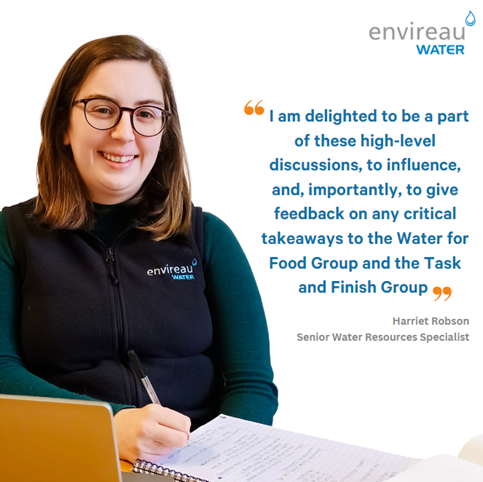Harriet Robson Chairs National Drought Group Workshop
In 2022 the Water for Food Group (WFFG) Task & Finish Group was created to develop a drought management plan template and water security planning tools specifically for the agri-food sector.
The Water for Food Group brings together a group of stakeholders including the Environment Agency, Defra, the National Farmers Union (NFU), academics, water consultants, the Food and Drink Federation, and several other industry groups, while the Task and Finish Group includes a small specialist team drawn from the stakeholder group.
Harriet Robson, a Water Resources Specialist at Envireau Water, was chosen as the chair of the Task & Finish Group, based on her experience in the water industry working on drought plans and drought permit applications as well as her water resources management work with Envireau Water where she assists a wide range of industry groups including the agri-food sector.
We talked to Harriet to understand the Group's important role and how as Chair, she is able to use her experience and expertise and to get involved with the UK’s National Drought Group.
The background
Harriet explained that water resource management and drought plans are embedded within the operations of water companies throughout the UK as part of their regulations and the recognition that water supply to households is an essential need.
On the other hand, UK Government does not see water for growing food as an essential need.
Only last month, newspaper headlines reported empty supermarket vegetable shelves, whilst the Environment Agency irrigation prospects warned of likely summer drought, particularly in East Anglia, with warnings about the availability of water for irrigation.
Harriet went on to say “The lack of structured planning for resilience, investment, and drought management in the agri-food sector has the potential to lead to significant crop losses. The shortage of water for growing food during a drought is a significant problem, as the farmers are the first to have their abstraction stopped and the last to get their water back.”
The Task and Finish Group
Harriet describes the Task and Finish Group as the answer to the pressing need for action. The collective collaborates by converging policy understanding with technical skills and operational experience. Envireau Water's Tamsin Morey, (Principal Water Resources Specialist), and Harriet provide input from a technical water resources management perspective.
Harriet applies her experience developing public water supply Water Resources Management Plans and Drought Plans for Essex and Suffolk Water to the Group, as they seek to establish Water for Food as an essential need and ensure that water is available when it is needed in appropriate and environmentally safe amounts.
The National Drought Group
The work being delivered by the Task and Finish Group recently led to Harriet chairing the agriculture section of a National Drought Group workshop. The National Drought Group includes Water Company Executives and leading personnel from the Environment Agency and Defra, the NFU and other nationally critical organisations.
Harriet commented;
"The session was vital to reflect on the drought experienced in 2022 to aid future resilience. The discussions covered the possibility of improving Environment Agency communication around drought to enhance preparation time for farmers, and streamline the Reservoir Grant system to decrease planning constraints and aid access to water when it is available, and store it for when it is not.
I am delighted to be a part of these high-level discussions, to influence, and importantly, to give feedback on any critical takeaways to the Water for Food Group’s Task and Finish Group. We have already started incorporating some of the learnings into the framework we are working on, and which we hope to launch later this year."
The Task and Finish Group's work will be critical in providing the agri-food sector with a planning tool to manage water resilience and drought, ensuring that water for growing food is recognised as an essential need for the UK. Here at Envireau Water, we are delighted to support Harriet and Tamsin as they play a vital role in reducing water security risks for the agri-food sector.

Learn more about Harriet Robson MSc
I am a Senior Water Resources Specialist based in the North Office in Richmond. I joined Envireau Water in 2022 and have six years of water resources experience, having worked previously for Essex and Suffolk Water and Mott MacDonald. During that time, my role primarily focused on managing surface water abstraction; and creating models to assess various future outcomes with different climate change scenarios and droughts.
Prior to this, I graduated from Durham University with a BSc in Geophysics with Geology and an MSc in Hydrology and Climate Change from Newcastle University. My master's thesis was on the relationship between climate change and river flooding. I developed an interest in water resources at Durham and was keen to positively impact water management across the UK. I am also on the committee of the CIWEM East Anglian Branch, having previously held the role of Branch Chair, and I am working towards Chartership.
As a Senior Water Resources Specialist for Envireau Water, my role focuses on the regulatory aspects of water resources management, including abstraction licensing, discharge permitting, and nutrient neutrality; as well as continuing to support water companies such as South West Water in drought planning and permitting.








